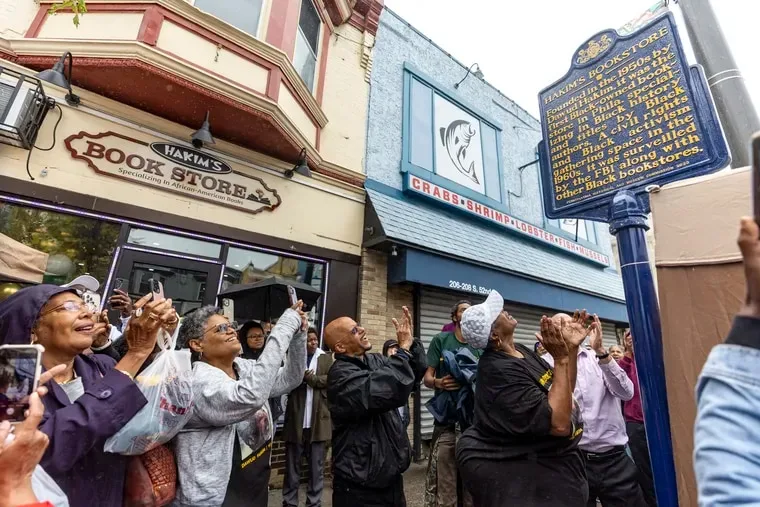
In 1959, a young, bookish accountant named Dawud Abdel Hakim started doing something highly unpopular: selling books about African American history written by African Americans — first from the trunk of his car and later from his namesake store on S. 52nd Street in West Philadelphia.
During a time when the Black Power movement was gaining adherents and then-FBI Director J. Edgar Hoover was issuing memos saying that bookstores such as Hakim’s were “outlets for revolutionary and hate publications and culture centers for extremism,” Hakim was focused on his mission: to ensure that African Americans knew they had a rich history that pre-dated slavery.
Last Saturday, over six decades after the store’s launch, a state historic marker was unveiled before a group of about 100 friends, customers, and family members who braved a cold rain to pay tribute to the man who nurtured generations of budding intellectuals, scholars, booksellers, and civil rights activists.
“In 1959 it was not popular to talk about Black history. Hakim stood tall telling the untold story,” State Senator Vincent Hughes said at Saturday’s event. “To be in business for 64 years is no small feat.”
The man behind Hakim’s Bookstore
“My father would have been overwhelmed. It would have brought tears to his eyes,” said Hakim’s daughter, Yvonne Blake, who took over when Hakim died in 1997 and now runs it with the family’s fourth generation members. “Had it not rained we would have had even more people here.”
Hakim was a 1949 West Philadelphia High School graduate who, while working at the post office, came across the 1934 book 100 Amazing Facts About the Negro by Joel A. Rogers, a Jamaican-American self-taught historian who wanted to combat racist propaganda history. The book ignited in Hakim a lifelong passion for African American history and a desire to teach others.
“They tell me my father would ask a passing child if they had a dollar and then give them books. And when they came back, he would quiz them on the books,” Blake said.
But for Hakim, making the bookstore a success was not easy. Customers were few and profits were slow, and he had to keep his day job as an accountant for the City in order to support his wife and three daughters while running the store. Blake said it wasn’t always easy to understand her father’s tenacity and vision.
“My father would take me to the bookstore and no one came in. You know when you go to a store, you expect to see people,” Blake recalled. Instead she sat outside the store with her father and learned to play chess while selling an occasional greeting card.
Saving Hakim’s
Despite the challenges Hakim faced, the store grew. And by 1980, Hakim opened another store in Atlanta, where he taught history at Morehouse College. When Hakim died, Blake closed the Atlanta store because there was no family member nearby to oversee its daily operation.
Like her father, Blake also faced serious economic challenges when she took over the store after his death. “I promised him when he died that I would keep it going as long as I can,” she said.
Chain stores, the Internet, Amazon, and a recession all while working a full-time job with PECO made keeping that promise difficult. When her mother became ill, she thought that was the end of the bookstore.
“My father would have been overwhelmed. It would have brought tears to his eyes.”
“I was thinking of closing in 2015,” Blake said. That same year, Inquirer columnist Helen Ubiñas, writing for the Daily News at the time, penned a column about the possible closing that helped galvanize community support.
“We just might save the city’s oldest African-American bookstore,” Ubiñas later wrote in a follow up piece.
It was that series of articles that brought the day’s ceremony emcee, Christopher Arnold, to Hakim’s Bookstore as a volunteer and to help Blake modernize the store. “I want to help the family honor the mission of the founder,” he said.
Keeping history alive
The University City Historical Society helped prepare the extensive application procedure, including hiring an historian, said UCHS president Amy Lambert, a preservation historian and registered architect.
Lambert said after the George Floyd protests of 2020, the UCHS, a volunteer group, began to reflect on how the organization could be of service. That lead to a call to The Enterprise Center, a business management education center in West Philadelphia, and the suggestion to help prepare the marker application for the bookstore.
“Amy worked on this for over a year. We were notified [of acceptance] in December 2022 and I was blown away,” Blake said.
“It has not been a thing to lift up Black history with these markers,” said Sen. Hughes. “Now it is the standard.”
Hakim believed that history strengthened the African American community and for that reason should be memorialized.
“My father recognized we had a history that didn’t start with slavery,” Blake said. “We had a place and contributed to the wealth of this country and were not second-class citizens.”

